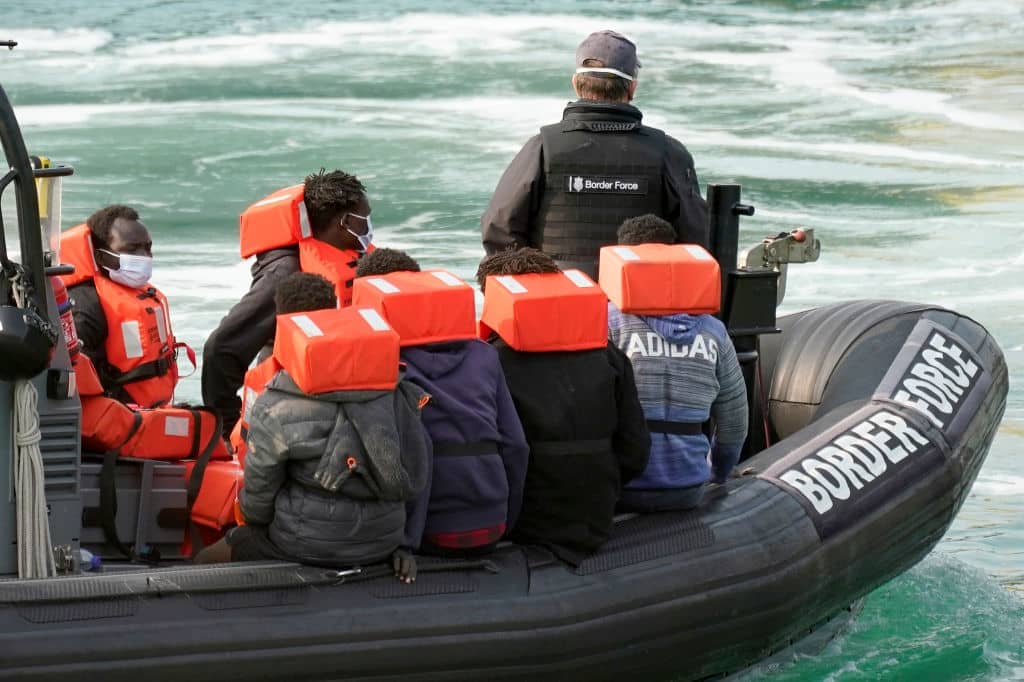The sheer number of useless interventions that have been touted as offering a solution to the cross-Channel migrants crisis is bewildering. Various rounds of talks with France about heightened cooperation to make the route non-viable; paying large sums of money to France to fund beach patrols; appointing a cross-Channel Clandestine Threat Commander; threatening to ‘call in’ the Royal Navy; threatening to turn back overladen boats in the world’s busiest shipping lane; pressuring social media platforms to prevent successful landers from sharing videos of themselves looking happy and triumphant that supposedly create a pull factor for others; even a direct prime ministerial interview to camera promising ‘we will send you back’.
As I have documented on this site before, all these initiatives or pretend initiatives were doomed to failure so long as a central fact was still in place: that somebody landing illegally on the south coast gets to live in Britain with board and lodging paid for and very little prospect of swift removal so long as they lodge a claim for asylum.
And failed they all have, to the point that the electorate has moved beyond simple cynicism about the promises of Tory ministers and into outright rage at having its intelligence insulted as the route becomes the very opposite of ‘unviable’ (copyright, Priti Patel).
Yet there is one policy that really could bring this chaotic maritime traffic under control. Implementing it would lay the Government open to the wrath of the liberal establishment, no doubt including bien pensant literary figures, peers of the realm and the sort of Church of England clerics who prefer to participate in ‘pray to stay’ schemes rather than wake up to the growing Islamist threat faced by this country.
That policy is a move to standard offshore processing – somewhere very far away – of asylum applicants who have arrived illegally in the UK. After all, why would anyone pay several thousand pounds to a people trafficker only to end up stranded in a camp in Timbuktu, Zanzibar or wherever, far from the UK?
There is one policy that really could bring this chaotic maritime traffic under control
If ministers really intend to ‘break the business model of people smugglers’ (copyright Priti Patel) then, aside from a highly improbable pledge emerging from France to take back every irregular migrant, this is the one measure which would be likely to work. It worked for Australia when that country was being targeted by people smugglers based in South East Asia and the international hoo-ha that accompanied it was water off the proverbial duck’s back to Australian public opinion. The boats mostly stopped and so did the deaths at sea.
Earlier this year, there were speculative reports that the UK Government was exploring the possibility of a partnership with Denmark to set up an asylum processing camp in Rwanda. Nothing solid has so far come of that. But now the Times is reporting that British authorities have been in talks with Albania about it hosting such a camp.
‘Offshore processing is our best hope now, as nothing else is working,’ one slow-learner in ministerial ranks was reported as telling the newspaper. Now this could be – and bitter experience should tell us, probably is – yet more wing-and-a-prayer stuff that won’t actually happen. Certainly Albanian authorities have poured cold water on it, with the country’s ambassador Qirjako Qirko denying bilateral talks are taking place and pledging to ‘never agree’ to host processing centres.
And yet if the Government has taken a decision to move to offshore processing, it is hardly a dealbreaker should Albania turn down a sackful of loot to play host. The UK has enough far-flung overseas territories and dependencies – and a big enough foreign aid budget to raid – to find somewhere willing to do so and pay it handsomely.
When asked about talks with Albania, Justice Secretary Dominic Raab told Sky News today:
‘Well that’s one country, but we are willing to look with partners at whether it’s possible to do this international processing.’
The Nationality & Borders Bill currently going through Parliament contains general clauses which could permit such a policy, though no specified plan to implement it.
In the Commons on Wednesday, the Tory MP Caroline Ansell, whose Eastbourne constituency has been hosting some of the migrants in a high-profile seafront hotel, asked the Prime Minister:
‘If migrants and asylum-seekers knew that they would be directly returned to France or taken to a third country pending application…would they risk a dangerous and illegal crossing and make their way to France in the first place? Can I ask him what further measures are being considered?’
Boris Johnson seemed non-committal in response, merely promising that the new legislation would ‘make it possible at last to distinguish between those who come here legally and those who come here illegally’. That may have hinted at harsher treatment for the latter group but fell well short of committing to offshore processing.
Veteran Tory contrarian David Davis has pledged to try and rip out the permissive clauses from the Bill by means of an amendment, branding them ‘impractical and potentially cruel’. His 20,000 majority in Haltemprice and Howden may withstand such a ruse, but the wafer-thin majorities of many of his colleagues will surely not, so it will be interesting to see how many sign up to his rebellion.
That ministers have been forced to publicly discuss the one measure with a chance of success represents real progress. Why? Because just raising the prospect also raises the political price to be paid for failing to follow through.
As was true with the campaign for a Brexit referendum, a Tory PM will have to choose between enraging his political base or enraging the non-Tory establishment. As someone who has tended throughout his career to understand on which side his bread is buttered, it is hardly a dilemma for Downing Street’s classical scholar to compare with Scylla and Charybdis.







Comments